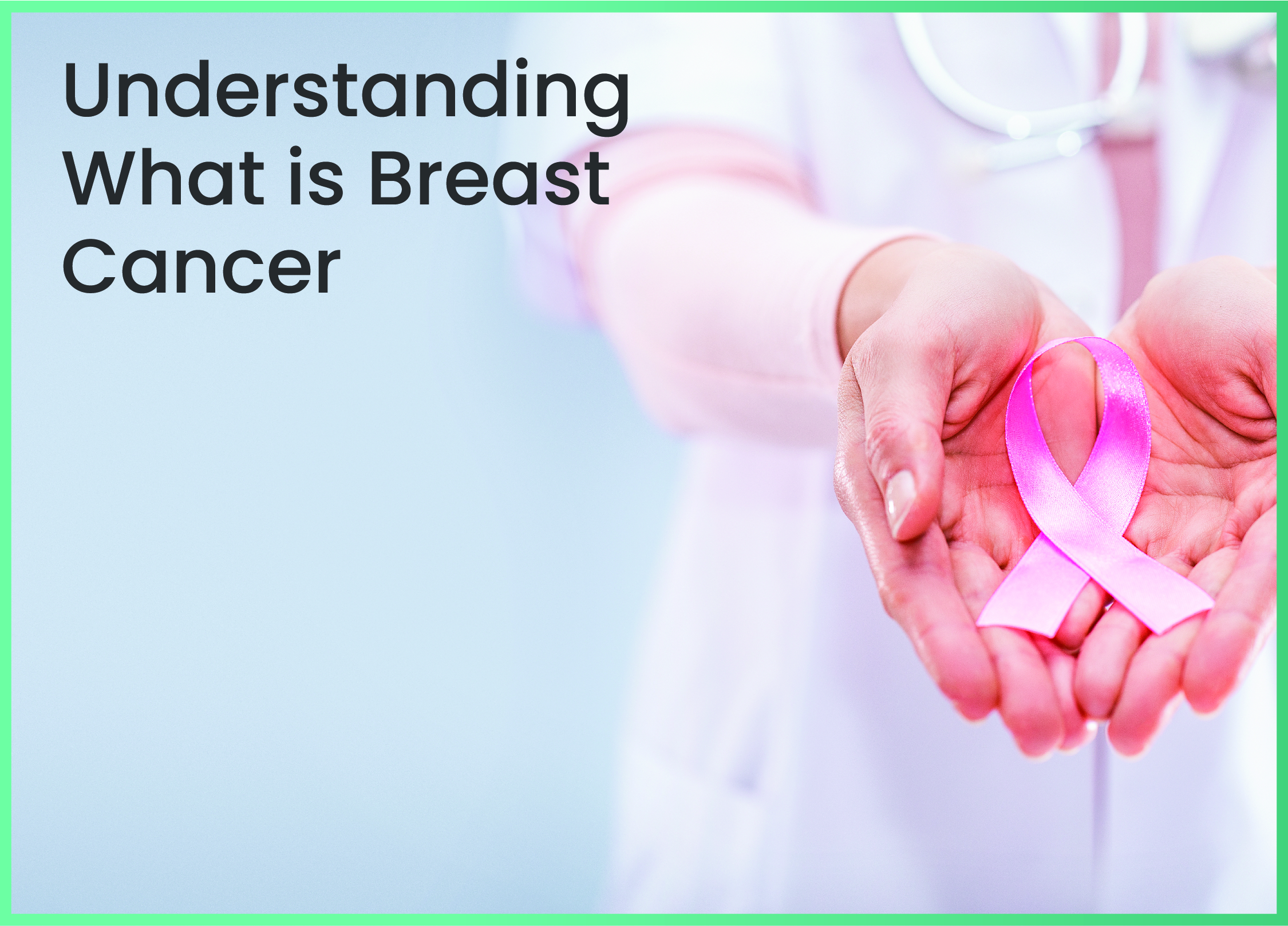
Breast Cancer
Understanding Breast Cancer
Breast cancer happens when cells in the breast start growing abnormally and form a lump or tumor. It is one of the most common types of cancer in women, though men can also get breast cancer in rare cases.
While hearing the word “cancer” can be overwhelming, it’s important to know that early detection, proper treatment, and a strong support system can lead to very good outcomes.
Types of Breast Cancer
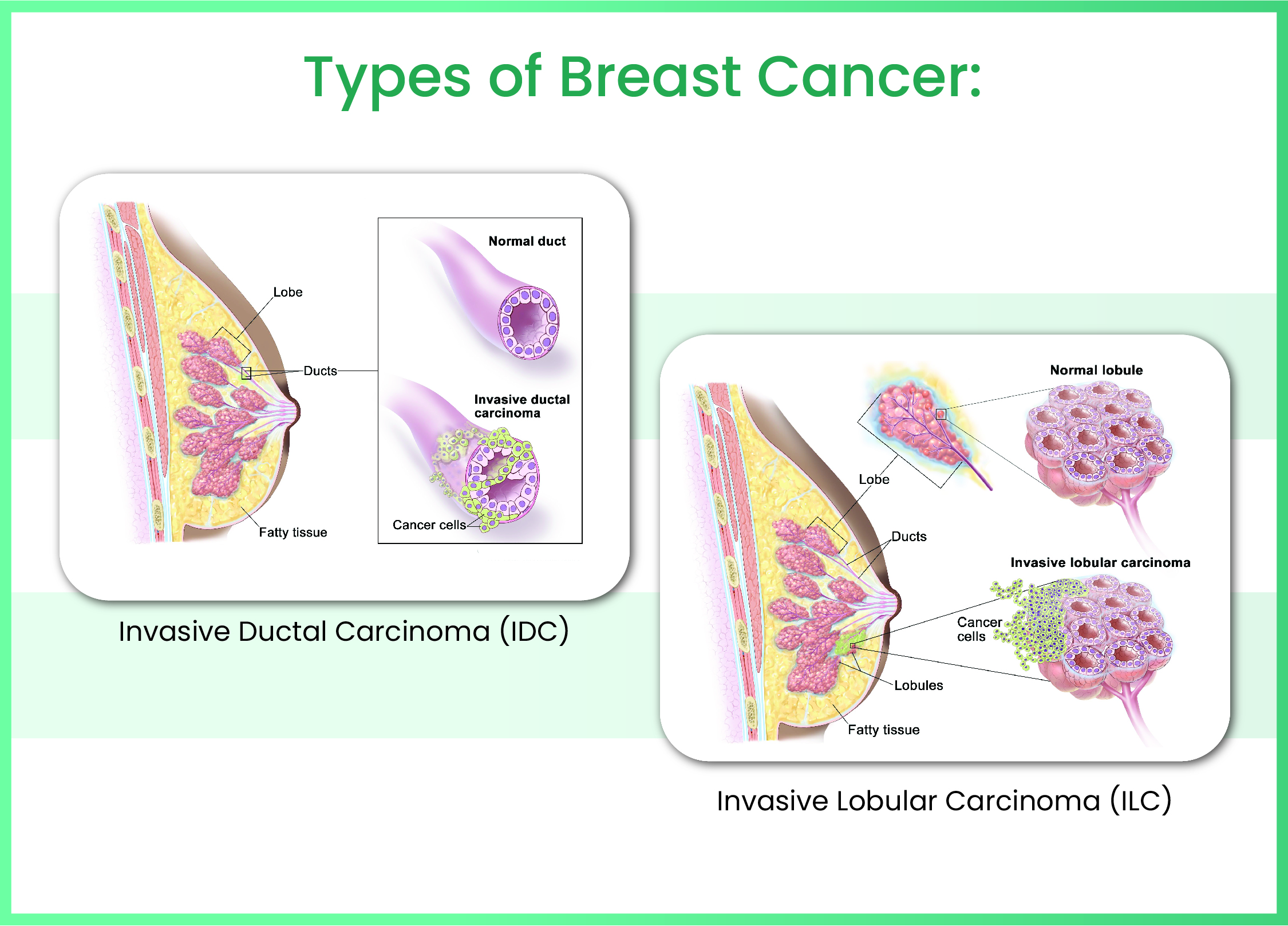
Invasive Ductal Carcinoma (IDC)
This is the most common type of breast cancer. It starts in the milk ducts and then invades surrounding breast tissue. It may spread to lymph nodes or other parts of the body if not treated early.
Invasive Lobular Carcinoma (ILC)
This cancer begins in the milk-producing glands (lobules). It’s the second most common type and can be more difficult to detect on imaging due to its growth pattern.
Breast cancer is not a single disease. There are different types, and each one behaves differently. Understanding the type of breast cancer helps in planning the right treatment and predicting the outcome.
Signs and Symptoms of Breast Cancer
Knowing what to look for can lead to early diagnosis and better outcomes. If you notice any of the following signs, it’s important to schedule a consultation with a breast specialist.
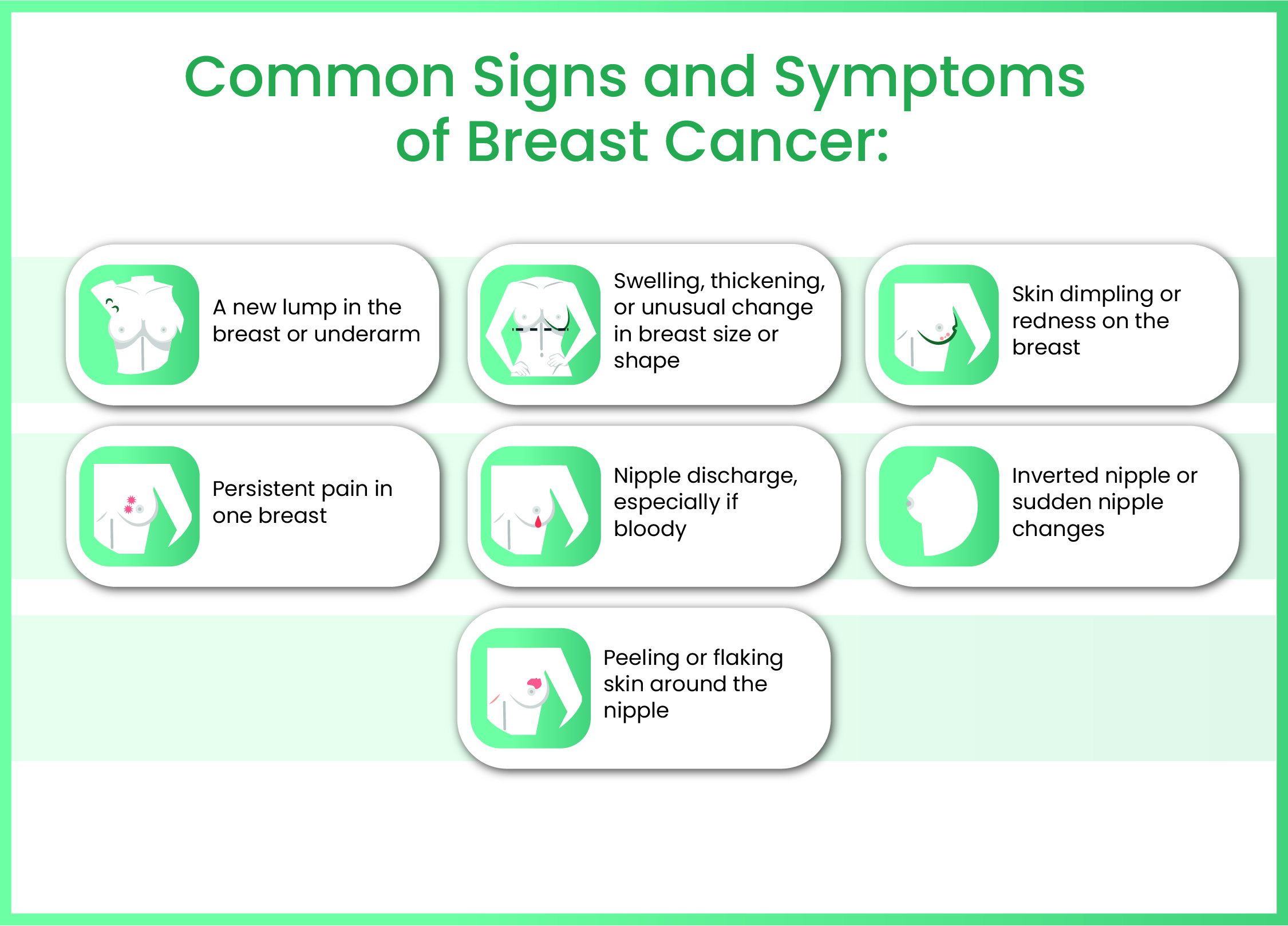
- A new lump in the breast or underarm
- Swelling, thickening, or unusual change in breast size or shape
- Skin dimpling or redness on the breast
- Inverted nipple or sudden nipple changes
- Nipple discharge, especially if bloody
- Persistent pain in one breast
- Peeling or flaking skin around the nipple
If you experience any of the above signs and symptoms, consult a specialist without delay.
Get in touch with Dr. Reetu Jain, the best breast cancer specialist in Mumbai, for expert care and timely guidance.
Breast Self-Examination (BSE)
Monthly breast self-exams are a simple and powerful way to monitor your own breast health. Dr. Reetu Jain educates patients on the correct technique for BSE during consultations.
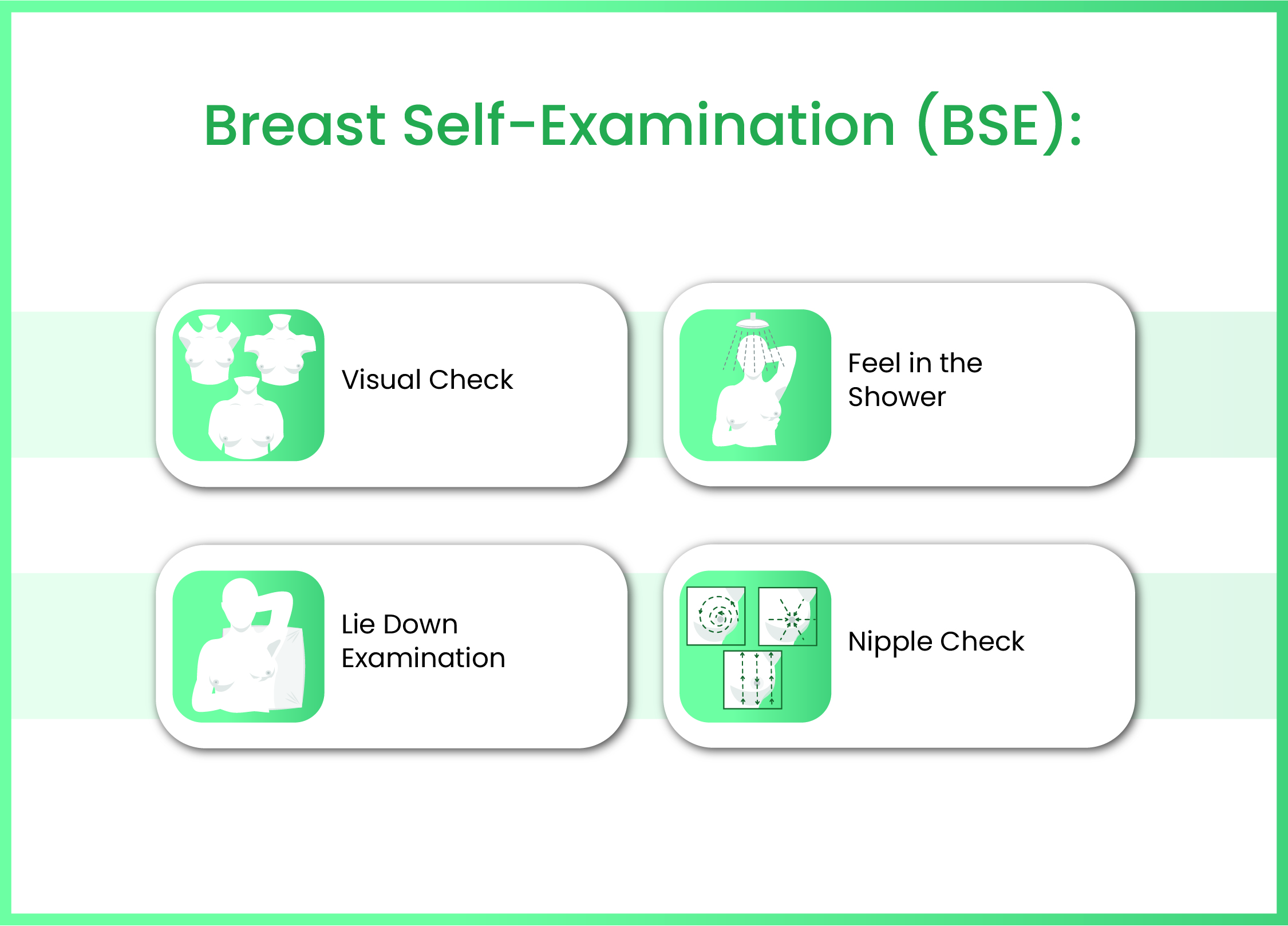
How to Perform a Self-Exam?
- Visual Check: Stand in front of a mirror and look for any visible changes in breast size, shape, or skin texture.
- Feel in the Shower: Use flat fingers to feel for lumps in a circular motion while standing. Cover the entire breast and underarm area.
- Lie Down Examination: Repeat the process while lying flat on your back, using circular movements to check all parts of the breast.
- Nipple Check: Gently squeeze the nipple to see if there’s any unusual discharge or tenderness.
Who is at Risk for Breast Cancer?
Understanding risk factors helps in making proactive decisions. Dr. Reetu Jain offers personalized breast cancer risk assessments, especially for women with family history or genetic concerns.
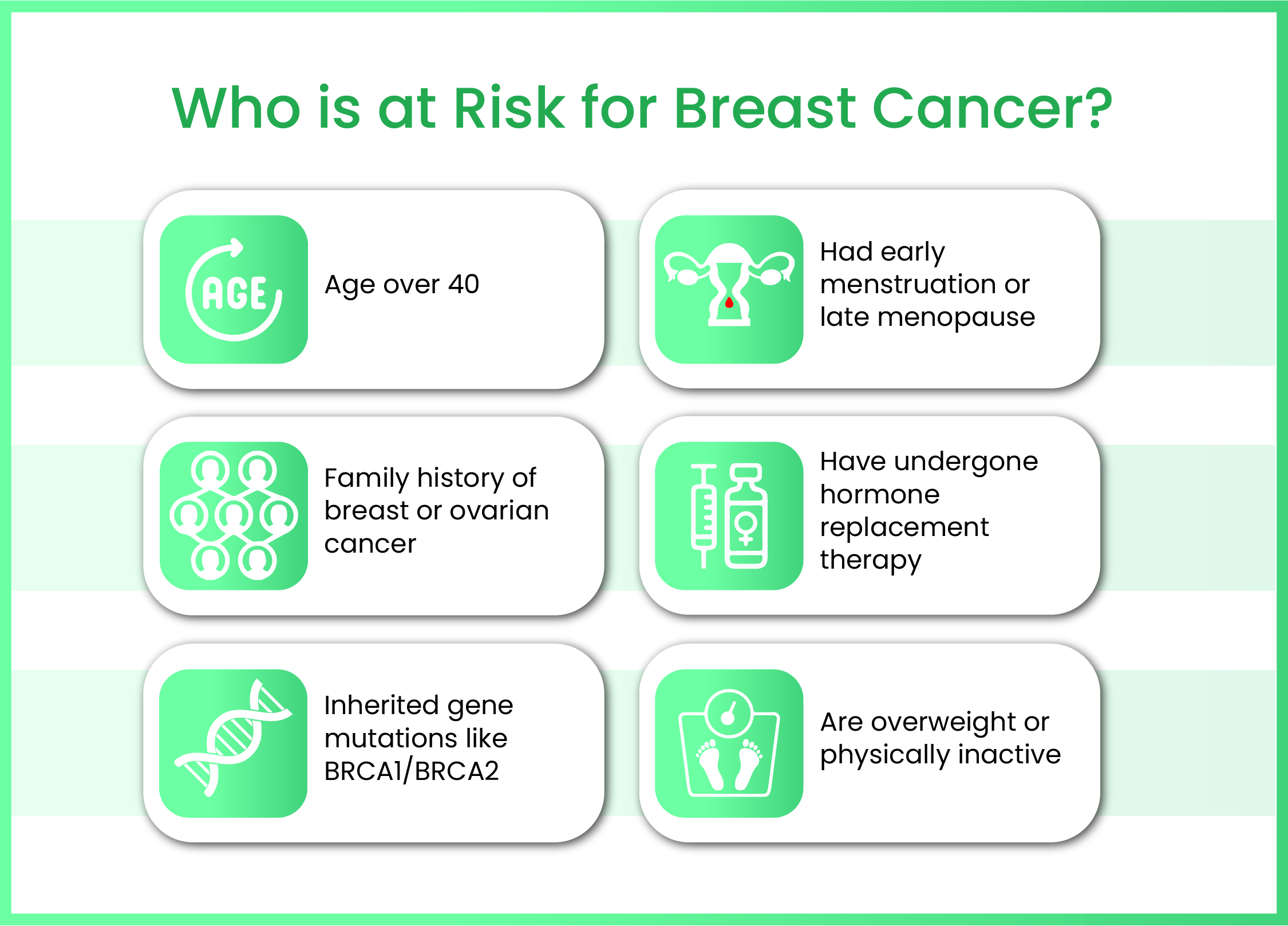
Certain individuals may have a higher likelihood of developing breast cancer based on specific risk factors. Knowing these can help in taking timely preventive measures.
- Age over 40: Risk increases with age, particularly after 40.
- Family history: Having close relatives with breast or ovarian cancer raises risk.
- Genetic mutations: Inherited gene mutations like BRCA1 or BRCA2 can significantly increase risk.
- Hormonal history: Early menstruation or late menopause can elevate risk levels.
- Hormone therapy: Long-term hormone replacement therapy may slightly increase the risk.
- Lifestyle factors: Being overweight or physically inactive can contribute to higher risk.
Dr. Reetu Jain, recognized as a leading breast cancer doctor in Mumbai, offers personalized risk assessments and screening plans tailored to each individual.
Lifestyle Improvements to Lower Your Breast Cancer Risk
A healthy lifestyle can significantly lower your risk of developing breast cancer. Our team provides practical tips and preventive care services led by Dr. Reetu Jain.
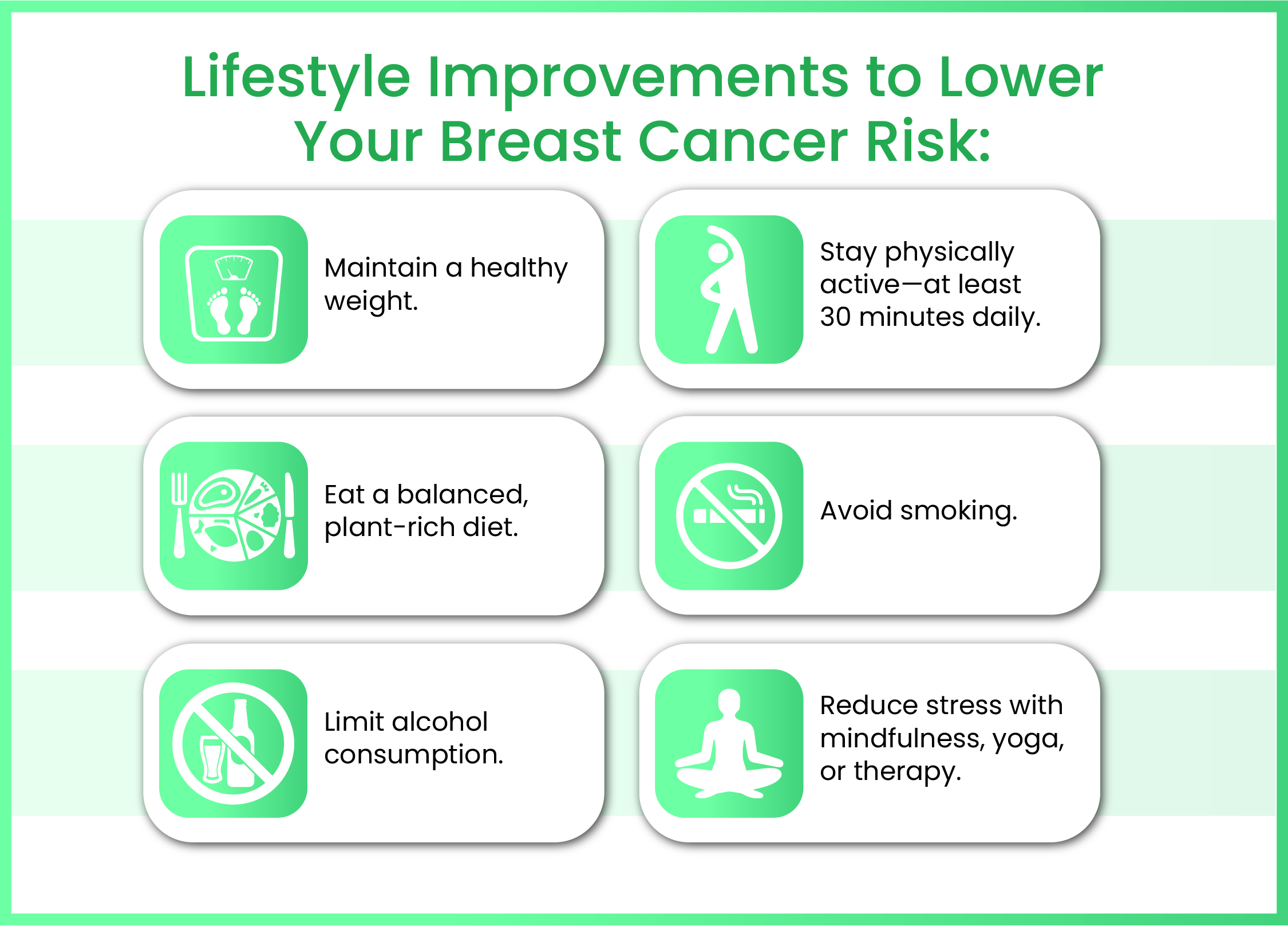
Recommended Lifestyle Changes:
- Maintain a healthy weight.
- Eat a balanced, plant-rich diet.
- Limit alcohol consumption.
- Stay physically active—at least 30 minutes daily.
- Avoid smoking.
- Reduce stress with mindfulness, yoga, or therapy.
We also offer nutritional counseling and wellness programs to support your long-term breast health journey.
How is Breast Cancer Diagnosed?
Early and accurate diagnosis is the key to successful breast cancer treatment. At Jaslok Hospital, Dr. Reetu Jain, a highly experienced breast cancer surgeon in Mumbai, ensures that every patient undergoes a thorough evaluation using the most advanced diagnostic tools available today.

Clinical Breast Examination: Where surgeon begins with a detailed physical examination of both breasts and underarms:
- Lumps or thickened areas
- Skin changes like dimpling or puckering
- Nipple changes or discharge
- Swelling or asymmetry between breasts
A clinical breast exam is often the first step and helps decide whether further tests are required.
Breast Imaging Tests:
Mammography: This is the most common screening tool used to detect small tumors, often before symptoms appear. A mammogram uses low-dose X-rays to capture images of the internal breast structure.
- Screening Mammogram – For women with no symptoms (usually after age 40)
- Diagnostic Mammogram – For women with symptoms like a lump or pain
Breast Ultrasound: Uses sound waves to check if a lump is solid or fluid-filled. Preferred for younger women with dense breast tissue.
Breast MRI: Provides highly detailed images, especially in high-risk patients or to assess the extent of cancer before surgery.
Biopsy – Confirming the Diagnosis: If any abnormality is detected, a biopsy is the only way to confirm whether cancer cells are present. Types of biopsies include:
- Fine Needle Aspiration Cytology (FNAC): A thin needle extracts cells. Quick but may not always give detailed results.
- Core Needle Biopsy: Uses a larger needle to remove a tissue cylinder for detailed analysis.
- Vacuum-Assisted Biopsy: Minimally invasive, often used for sampling microcalcifications or small tumors.
- Surgical Biopsy: Sometimes the entire lump or part of it is surgically removed for examination.
Pathology & Receptor Testing: After biopsy, the tissue sample is analyzed in the lab to determine:
- If the lump is benign or malignant
- The type of breast cancer
- The grade (how aggressive the cancer is)
- Presence of hormone receptors (ER/PR)
- HER2 protein levels
These results help classify the cancer and decide the best treatment approach, including hormonal or targeted therapies.
Staging Workup: Once cancer is confirmed, staging helps determine how far the cancer has spread in the body. This step is crucial in deciding treatment and prognosis. Tests may include:
- PET-CT scan
- Chest X-ray
- Bone Scan
- Abdominal Ultrasound or CT scan
Staging is essential for treatment planning and prognosis.
If you’ve noticed a lump, change, or discomfort in your breast—or you’re just due for a routine screening—trust your care to Dr. Reetu Jain, one of the most respected breast cancer specialists in Mumbai.
Treatment Options for Breast Cancer
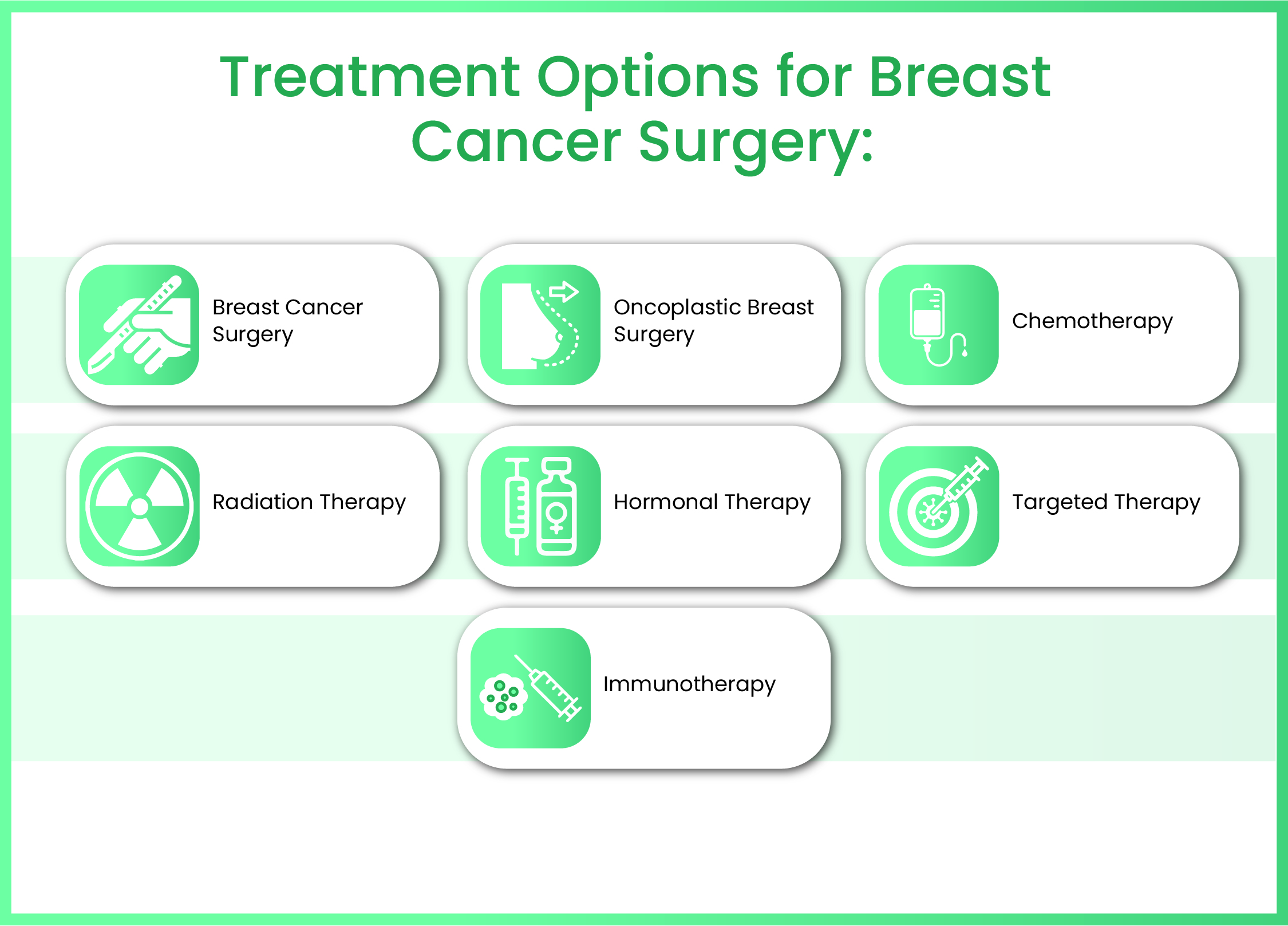
1. Breast Cancer Surgery: Surgery is often the first and most important step in treating breast cancer. There are two types of surgery in breast cancer lumpectomy (breast-conserving surgery) and mastectomy (complete breast removal) depending on the tumor’s size and location.
In a lumpectomy, only the tumor and a small margin of surrounding tissue are removed, making it ideal for early-stage cancers. For larger or multifocal tumors, or in cases of high genetic risk, a mastectomy may be recommended.
Alongside tumor removal, lymph node surgery is also performed to assess if the cancer has spread. This could involve a sentinel lymph node biopsy or axillary lymph node dissection depending on the case.
2. Oncoplastic Breast Surgery: This technique combines cancer removal with cosmetic surgery principles, ensuring that the breast retains a natural look after surgery. For patients who undergo mastectomy, Dr. Reetu Jain also offers breast reconstruction, which can be done immediately or later using implants or tissue from the patient’s body.
3. Chemotherapy: If the cancer is aggressive or at an advanced stage. Chemotherapy involves powerful drugs that circulate throughout the body to kill any remaining cancer cells and reduce the risk of recurrence. It may be given before surgery (neoadjuvant) to shrink tumors or after surgery (adjuvant) to prevent relapse.
4. Radiation Therapy: Radiation therapy is another key part of breast cancer treatment, especially after lumpectomy. It uses high-energy rays to destroy microscopic cancer cells that might remain in the breast or nearby lymph nodes.
Advanced techniques such as 3D-CRT and IMRT are used to precisely target only the cancer-affected areas while protecting nearby healthy tissue, including the heart and lungs. This helps in minimizing long-term side effects and improving treatment outcomes.
5. Hormonal Therapy: Hormonal therapy for breast cancer uses medications to slow or stop the growth of cancer cells that are sensitive to hormones like estrogen and progesterone. It’s like turning off the fuel source for breast cancers that need these hormones to grow.
6. Targeted Therapy: Targeted therapy focuses on attacking specific weaknesses in cancer cells without harming healthy cells. It is often used when breast cancer cells have certain traits or markers like HER2 positive or hormone receptor-positive.
These therapies can stop cancer growth, prevent spread, or even help other treatments work better.
7. Immunotherapy: In more complex or aggressive cases like triple-negative breast cancer (TNBC), where hormonal therapy and HER2-targeted therapy are not effective, immunotherapy may be used in combination with chemotherapy. Immunotherapy helps the body’s immune system recognize and fight cancer cells.
This approach is especially helpful in younger women or in cancers with high risk of recurrence or spread.
Expert Care at Jaslok Hospital: Dr. Reetu Jain is a highly experienced and compassionate breast cancer surgeon in Mumbai, currently practicing at the prestigious Jaslok Hospital. Known for her precise surgical skills and patient-first approach, Dr. Jain has helped hundreds of women navigate breast cancer with confidence and clarity.
She offers comprehensive care—from early diagnosis and personalized treatment plans to advanced surgical options like lumpectomy, mastectomy, and breast reconstruction.
As one of the best breast cancer doctors in Mumbai, Dr. Reetu Jain is committed to providing holistic care with a focus on both physical recovery and emotional well-being. Her expertise in oncoplastic breast surgery ensures that patients not only receive life-saving treatment but also maintain their quality of life and body image.
If you are looking for a trusted breast cancer specialist at Jaslok Hospital, Dr. Reetu Jain brings world-class care, right here in Mumbai.
Frequently Asked Questions (FAQs)
Some early signs include a painless lump in the breast or underarm, changes in breast size or shape, skin dimpling, nipple discharge (especially if bloody), or a nipple turning inward. If you notice anything unusual, it’s best to consult a breast cancer specialist immediately.
Yes. Not all breast cancers present with a lump. Some may appear as changes in the skin texture, nipple inversion, redness, swelling, or persistent pain. That’s why regular self-exams and screenings are essential.
While most breast cancers are not inherited, about 5–10% are linked to gene mutations such as BRCA1 or BRCA2. If you have a strong family history, genetic counseling and testing can help assess your risk.
Recovery varies by the type of surgery. After a lumpectomy, most women recover within 1–2 weeks. Mastectomy or reconstruction may require 3–6 weeks. Dr. Reetu Jain provides personalized recovery guidelines to help you heal safely.
Not necessarily. Breast-conserving surgery like lumpectomy removes only the tumor. Even in mastectomy cases, oncoplastic and reconstructive techniques can help rebuild the breast shape immediately or later.
Not always. It depends on the cancer type, size, stage, hormone receptor status, and other factors. Some early-stage or hormone-sensitive cancers may be managed without chemotherapy.
Side effects vary based on the treatment (surgery, chemo, radiation). Common ones include fatigue, hair loss, nausea, swelling, and skin changes. Most are manageable, and supportive care is provided to minimize discomfort.
Yes. When detected early, breast cancer is highly treatable and often curable. Regular screenings and prompt treatment are key to excellent outcomes.
Yes, although rare, men can develop breast cancer. Symptoms and treatments are similar to those in women. Awareness and early diagnosis are important for both genders.
It depends on the type of surgery and whether radiation was used. Women who undergo lumpectomy often retain breastfeeding ability. Mastectomy removes the milk-producing glands, so breastfeeding from that breast won’t be possible.
Maintaining a healthy weight, exercising regularly, limiting alcohol, avoiding tobacco, and eating a balanced diet can lower risk. Regular screenings and self-examinations also help in early detection.
For women aged 40 and above, a mammogram every 1–2 years is generally recommended. Those at higher risk may need earlier or more frequent screenings.


